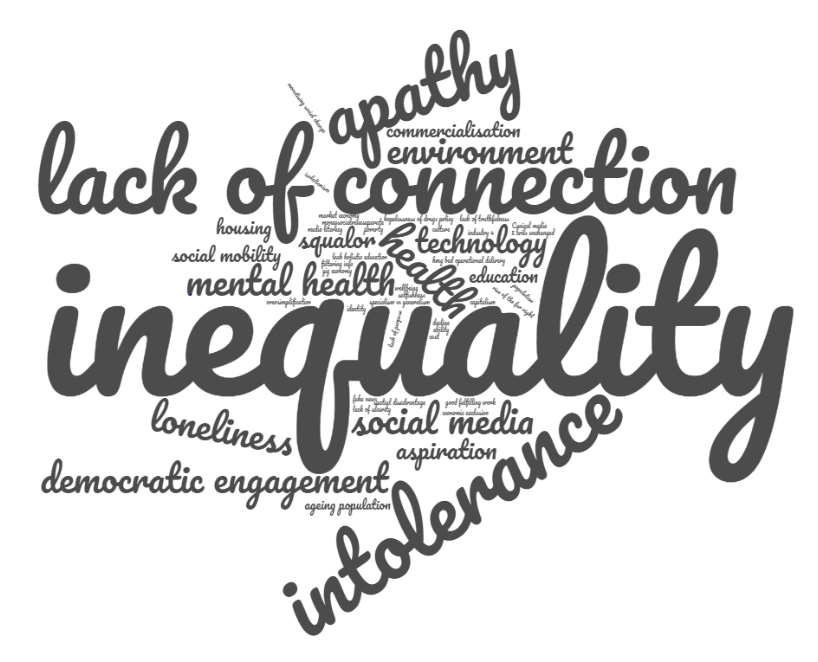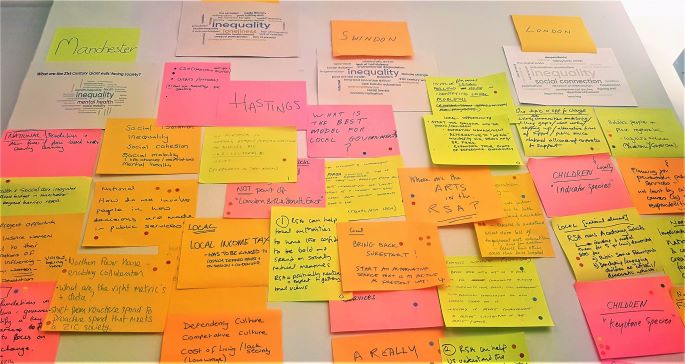Over the past two months the RSA’s Action & Research Centre has been undertaking a review of its work on public services and communities. As part of this we have held a series of regional events in order to gather the experiences and expertise of RSA Fellows and others working in the fields of public service and inclusive growth. At every event we asked the question: if William Beveridge was around today, how would he frame Britain’s new ‘giants’? This is what people told us.
Beveridge identified five giants in 1942 and some people at our events were quick to evaluate whether anything much has changed. There remains ample evidence of squalor, ignorance, want, idleness and disease but the majority felt that even if today’s giants had similarities with those of Beveridge they would be described very differently as our word cloud of responses suggests.

In pole position today comes inequality. This was mentioned most frequently at every single event and led to some fascinating discussions about its nature. Income and wealth inequality were at the forefront of people’s concerns and considered symptomatic of a society that had lost its moral compass. But in places like Manchester and Hastings there was a deep sense of spatial inequality too with a deep resentment towards London. Racial and gender inequality were also significant concerns as was the impact of inequality on our physical and mental health.
Secondly, many event participants were concerned with what was often phrased a ‘lack of connection’. Much as our travelling around the country laid bare the weaknesses of Britain’s transport infrastructure outside the capital, this lack of connection was much more profound. Isolation and loneliness were highlighted as key contributors to the apparent deterioration in the nation’s mental health – and nowhere was this felt more acutely than in London itself. Lack of connection even in the nation’s best connected city.
Third came ‘intolerance’ with many reflecting on the apparent polarisation evidenced by the Brexit referendum, the current state of party politics and the emergence of populist regimes around the world. Linked to this, some people spoke of ‘Fake News’ and a perceived lack of truthfulness at both personal and institutional levels which fuels division and exclusion. Heated debates ensued about the role of technology – and social media in particular – while few saw them as social evils, there was widespread concern about their regulation to mitigate their worst effects.
Giant number four was apathy. For some people this related to a sense of hopelessness and lack of aspiration in certain quarters but most saw the problem as symptomatic of our broken democratic system and people’s sense of deep disempowerment. Once again, recent political events loomed large: the pros and cons of referenda, the state of our political parties and our highly centralised decision-making structures.
Fifth and finally there was a profound concern for the environment. Naming the environmental evil about which we should be most concerned was more difficult. Some were concerned about energy use, our consumptive culture and air pollution while others spelt out more conservationist agendas concerning the future of housing, food, farming and the countryside.

Inequality. Isolation. Intolerance. Disempowerment. Environment. The five giants facing 21st century Britain. Taking the thought experiment a little further: if we were to redefine the respective roles of state and society in addressing these agendas what kind of system would we create? What kind of outcomes would we want to see? And how far would the policies and institutions we could develop resemble anything Beveridge would recognise? Event participants had countless ideas for opportunities ahead, pictured above. These are questions to which we will turn in the months ahead.
Many thanks to everybody who has participated in our review to date. We look forward to further engagement in the months ahead though feel free to post your further comments below. We look forward to outlining a new programme of work towards the end of the year.

Join the discussion
Comments
Please login to post a comment or reply
Don't have an account? Click here to register.
For me, there are linked issues that underpin some of these giants and these are connected to the way we think about them.
First is a sort of simplistic, often binary vision: something either is or isn't and there are no shades of grey. This supports tribalism. We have certain things is common and that makes us part of the same tribe - but if you don't have the particular characteristic, you're automatically not in the tribe and may be seen as he enemy. Brexit - it was bound to come up - is a classic binary problem. In a divided nation asking 'in' our 'out' (with really knowing what 'out' actually entails) was never going to solve the division. We may not know whether the current divide is 52/48 but we do know we have a divide.
Second - and this definitely links to the environment - is short-termism. A week, we are told, is along time in politics but a day seems a long time now. Politicians have a timescale of the next election - and things are so perilous (fixed term parliaments notwithstanding) that the next snap election could be any time. We suddenly seem to have shortages of key staff but must have known about the impending problem for some time. PFI gave us short term gain but with possible long-term pain. Local government has been faced with drastic cuts to its funding and there is the risk that some may provide only basic services. Is that really a surprise? We can see possible environmental problems but seem powerless (pun intended) to do anything about them.
Finally, our love of technology can make that technology our master, not our servant.Thee is the irony that people glued to the smartphones are probably the same ones feeling isolated. When I was a child we played in the street. Now, not only the roads but the pavements are filled with cars. Presumably cars are more important than people. The regular stories about satnavs leading people down the wrong road - and people ignoring the signs - show how our trust can be misplaced.
In many ways the giants only gain that status because we hand it to them. Much could be done to tackle some of the symptoms of inequality - although the root causes will take longer; the other four giants feel as if we need to look at - and improve - how people relate to what is around them.
A very good summary Ed Cox! And if we are to go by Paul Vittles' experience in Australia, it seems these 'big giants' are universal in reality.
On 12 March 2018, I published a blog "How the stupidity of English officialism played right into Enoch Powell's Rivers of Blood speech; to devastating effect" [https://thekamugasachallenge.com/enoch-powell-speech/]. In that blog, I raised the possibility that the issue respecting the 'big giants' may have something to do with a failure to execute; that is, a failure to execute the vision contained in the Beveridge Report. I went on to suggest that whereas the Beveridge Report contained ringing declarations and ambition; the reality was that it was far harder to balance the said vision with practical measures and persistence. This failure to execute, I suggested, may be the reason we have Brexit today.
A while ago, you wrote powerfully about the idea for the "National Citizens' Jury." And, as I understand it, RSA Fellows in both Australia and New Zealand conducted a Zoom discussion on the very idea. There is a promise that a recording of the discussion will be made available to those us who were not able to participate. Do you think the idea for the "National Citizens' Jury" might be the answer to a situation such as this...in addition to Brexit?
Thankyou for the succinct summary of the issues that most concerned participants in your recent regional events. I am struck by how similar those 5 issues are to the public dialogue going on in Canada. We might call them slightly different names - disempowerment might be interpreted as loss of trust the political system and the consequent rise of populist governments in some provinces in Canada. We didn't have Lord Beveridge here, but we did have Tommy Douglas, the architect of what is now the Canadian health care system and while it is constantly under attack from some quarters we continue to have a public health care system that is free at point of use. I would be interested to know what the concerns of the young in particular are. We have an increasing precariat, and it is not just those who do not have post secondary education, many young Masters and Phd holders are finding it increasingly difficult to find decently paid work in their field and many of those who teach are sessional (no benefits and very low pay). No I am not part of the youth group, and I am desparately concerned about the future that we leave for my and everyone else\s grandchildren.
Thank you. This is fascinating, and all too familiar. I’ve been involved in rural development (mainly in England) for more than 25 years. All the giants listed were topics of interest in the rural white papers of 1995 and 2000, and the policy and programme approaches designed to address them, however imperfectly. Unfortunately, the main organisations tasked with tackling the problems (sorry, challenges), eg, the Countryside Agency, the Commission for Rural Communities, the Regional Development Agencies have gone, and Defra has largely lost interest/expertise (Brexit!?). In the meantime, charities have lost funding, Natural England (environment) has suffered cuts, and local authorities have been emasculated. It is, therefore, no wonder that the – rural - giants, in any event ever present to a certain extent, plod ever more heavily across the country, and through society.
Congratulations for this work.
In haste …
I'd be interested to know if the "audience" was primarily RSA members.
One of the things we know (research conducted a while ago) is that RSA members are predominantly from one broad Values orientation - one that is essentially Universalist, environmentally concerned, poverty aware, benevolent, and so on (versus power oriented, hedonistic, fearful, disciplinarian, and so on).
This matters because our standpoint on (in)equality, it's causes and what ought (not) be done about it is not a matter of economic, social or political LOGIC - it is about the EMOTIONAL response generated by our Values.
If we are to convince anyone to take any action that we might desire to effect these "Giant 5" issues, then we must learn to be humble enough to make our arguments to those, and in the language of those, that might typically oppose us (i.e. different Values orientations). This can be done - but it is not easy and it is not comfortable.
Beveridge had the "benefit" of WWII to pull people together and drive his agenda. What do we have today that actually draws us all together? It certainly isn't religion or party politics or Brexit or fairness. It seems that our society is in a state of dualism on virtually everything you can imagine. "Divide and conquer" has been the de facto operational strategem of politics for so many years now that there barely seems a glimmer of a way out.
IMHO, the question is not "What are the Giant 5 issues?" The real question is "What are the Giant 5 principles upon which we want to build and maintain our society?"